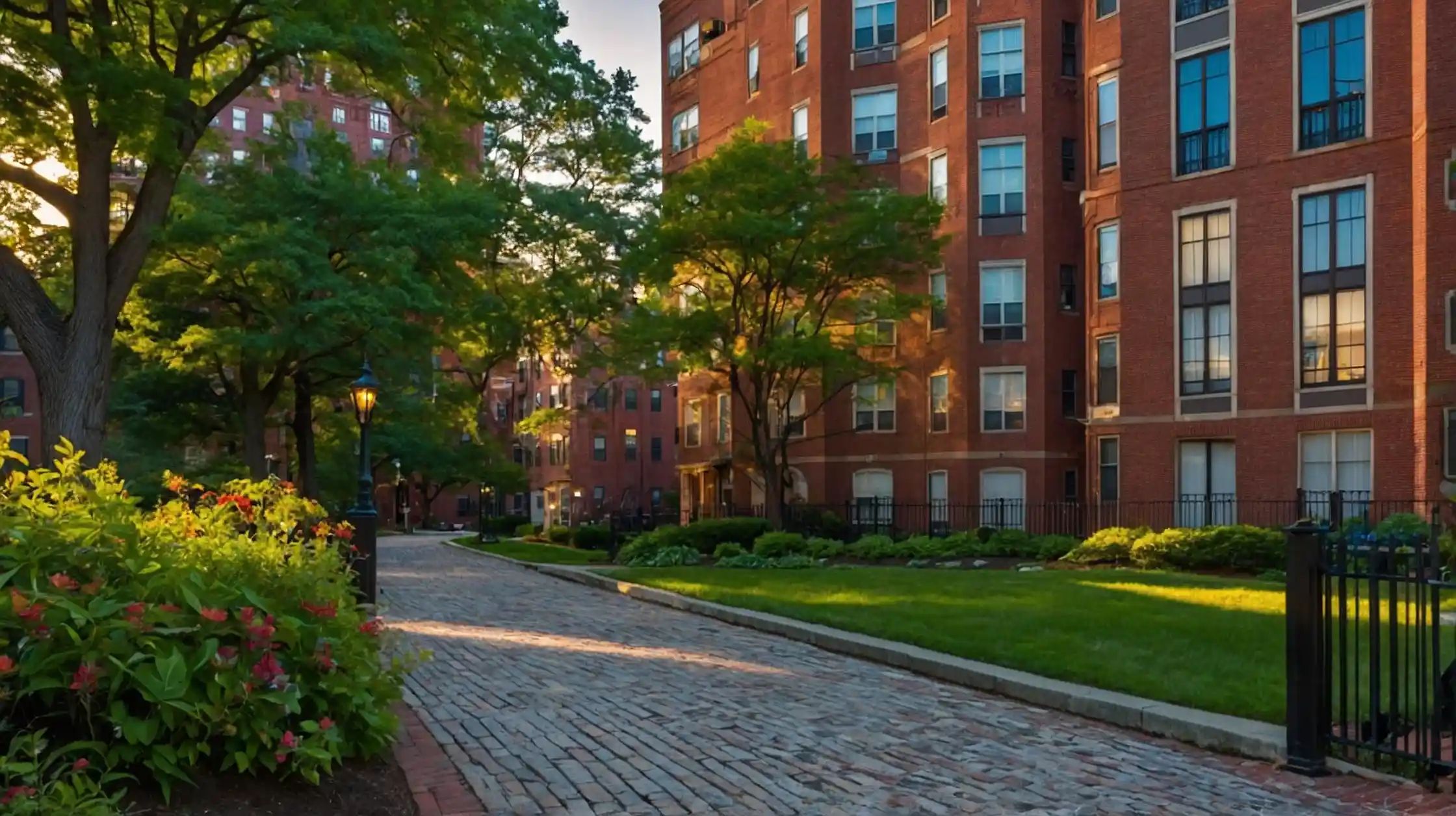When to Look for Apartments in Boston: Best Times to Search
When to look for apartments in Boston depends primarily on your target move-in date, with most successful searches starting 60-90 days before your intended move. For the popular September 1st cycle, start your search in May-June; for off-cycle moves, winter months (Dec-Feb) offer better deals and less competition. This comprehensive guide breaks down exact timing strategies by neighborhood, property type, and season to help you secure your ideal apartment.
Key Takeaways:
-
Start your search 90-120 days out for September 1st moves or 60 days for off-cycle moves.
-
Winter searches (December-February) offer 10-15% lower rents and more negotiating power.
-
Each Boston neighborhood follows different rental patterns, with student areas like Allston/Brighton heavily favoring September 1st moves, while downtown areas have year-round availability.

Understanding Boston's Rental Market Cycles
According to recent data from the Boston Housing Authority (BHA) and the Greater Boston Real Estate Board (GBREB), Boston's rental market follows distinct patterns shaped by multiple factors. As of early 2025, the median rental price in Boston proper has increased 7.3% year-over-year, significantly impacting when and where renters should begin their search.
Current Market Overview from Boston Housing Authority Data
The Boston rental landscape shows several key trends:
-
Average apartment vacancy rate: 3.2% (Q1 2024)
-
Median one-bedroom rent: $2,700
-
Areas with the highest turnover: Allston-Brighton (24%), Fenway-Kenmore (21%)
-
New development completion rate: 3,800 units expected in 2024
According to the Massachusetts Department of Housing and Community Development (DHCD), these figures represent a tighter market than the national average, making timing crucial for prospective renters.
Impact of Academic Calendar on Rental Timing
Boston's status as an education hub significantly influences rental cycles:
-
Peak listing period: June 15 - August 31
-
Highest turnover: September 1 ("Moving Day")
-
Secondary surge: January (spring semester start)
The presence of 35 colleges and universities, including Harvard Medical School and Boston University, creates predictable patterns in neighborhoods like Longwood, Fenway, and Allston.
How New Development Affects Availability
The Boston Planning & Development Agency (BPDA) reports significant new construction affecting rental availability:
-
12,000 units in various development stages.
-
Investment firms advertising “we buy land” are actively converting underutilized properties into new apartment complexes, increasing inventory in key neighborhoods.
-
Priority development areas include South Boston Waterfront and Dorchester.
The Massachusetts Housing Partnership indicates that new developments typically begin pre-leasing 2-3 months before completion, creating opportunities for early movers to secure better rates.
Key market indicators from MassLandlords.net suggest monitoring traditional apartment listings and new development pre-leasing opportunities for optimal timing in your search.
When to Look for Apartments in Boston: Prime Seasons
When searching for apartments in Boston, timing is everything. According to MLS data, specific seasonal patterns determine availability and pricing throughout the year.
September 1st: Boston's Biggest Moving Day
"Allston Christmas," as locals call it, marks the city's largest turnover of rental properties:
-
79% of leases in student areas turnover between August 31 and September 1
-
Start your search 3-4 months prior (May-June) for September moves
-
Expect 15-20% higher competition during this period
-
The Boston Housing Authority reports that 60% of annual lease turnovers occur in late summer
Winter Opportunities (December-February)
The Massachusetts Rental Housing Association identifies winter as the best time for deals:
-
Average rent savings: 10-15% below peak prices
-
Fewer competing applicants
-
More negotiating power with landlords
-
Best months for deals: December 15 - February 1
Spring Market (March-May)
Data from the Greater Boston Real Estate Board shows spring brings moderate availability:
-
The first wave of listings appears in March
-
Peak showing period: April 1-30
-
Early access to September 1 listings starts in April
-
Average of 45-60 days from application to move-in
Summer Rush vs. Summer Deals
RentHelper Boston market analysis reveals a complex summer season:
-
Early Summer (June):
-
First peak of September listings
-
Most competitive viewing schedules
-
Highest quality units available
-
Late Summer (August):
-
Reduced prices on remaining units
-
Limited selection
-
Faster application requirements
Pro Tip: The Boston Rental Housing Center suggests starting your search 60-90 days before your intended move date, except for September 1 moves, which require 90-120 days lead time for optimal selection.
Boston Neighborhood-Specific Timing Strategies
The Boston Housing Authority and Boston Pads Real Estate Network data show that each neighborhood operates on its unique rental timeline. Understanding these patterns can significantly improve your chances of finding the ideal apartment.
Downtown & Financial District Patterns
According to the Downtown Boston Business Improvement District's 2024 report:
-
Peak rental turnover: May-June (35% of annual leases)
-
Average listing time: 21 days
-
Best time to search: 60 days before move-in
-
Professional buildings typically require:
-
60-day notice from current tenants
-
First/last/security deposits
-
Proof of income (3x monthly rent)
Student Areas (Allston, Brighton, Fenway)
The Boston Planning & Development Agency's neighborhood analysis reveals:
-
Allston-Brighton cycle:
-
70% of leases start September 1
-
Begin search in April-May
-
Highest inventory: June 1-July 15
-
Fenway timing:
-
The secondary cycle starts on January 1
-
Medical resident influx in June
-
More flexible lease terms than Allston
Professional Hotspots (Back Bay, South End)
The Greater Boston Real Estate Board's 2024 market report indicates:
-
Back Bay patterns:
-
Year-round availability
-
Peak listings: March-April
-
Average time on the market: 14 days
-
Premium units are released 90 days before availability
-
South End timing:
-
Mixed cycles (not student-dominated)
-
Best deals: October-November
-
Luxury unit releases: Spring (March-April)
Emerging Neighborhoods and Development Zones
Massachusetts Housing Partnership data shows new opportunities in developing areas:
-
Seaport District:
-
New buildings lease 3-4 months pre-completion
-
More flexible move-in dates
-
Higher inventory in winter months
-
Investment companies are transforming areas like Dorchester and East Boston, creating new rental opportunities throughout the year
-
Assembly Row/Somerville:
-
Rolling availability
-
Best deals: December-February
-
New building releases quarterly
Pro Tip: The Boston Rental Housing Center recommends signing up for neighborhood-specific alerts through established real estate platforms to catch new listings as soon as they become available.
Expert Tips for Timing Your Boston Apartment Search
The Massachusetts Association of Realtors and Boston Apartment Brokers Association have compiled key strategies for timing your apartment search effectively. According to their 2024 renter success data, preparation and timing are crucial in securing preferred properties.
Working with Property Management Companies
The Greater Boston Real Estate Board recommends these timing strategies when working with significant property managers:
-
Contact larger companies (Equity, Windsor, Avalon) 90-120 days before move-in
-
Mid-sized local companies (Alpha Management, Newman Properties):
-
Begin outreach 60 days in advance
-
Schedule multiple viewings in one day
-
Request pre-approval before touring
-
Independent landlords typically list 45-60 days out
Using Real Estate Platforms Effectively
Boston Pads and MLS PIN data suggest optimal platform usage times:
-
Set alerts on major platforms:
-
Early morning (7-8 AM) for new listings
-
Sunday evenings for Monday releases
-
Thursday updates for weekend showings
-
Peak listing times by platform:
-
Zillow/Trulia: Tuesday-Thursday mornings
-
Facebook Marketplace: Weekend evenings
-
Property management websites: First of each month
Deposit Timing and Requirements
According to the Boston Housing Authority's 2024 guidelines:
-
Application fees: $30-75 (submit within 24 hours of interest)
-
Holding deposits:
-
September leases: Required 60-90 days prior
-
Off-cycle leases: 30 days prior
-
Typical amount: One month's rent
-
Security deposits must be ready within:
-
48 hours of application approval
-
Immediately for competitive properties
Pre-Approval and Documentation Preparation
The Massachusetts Rental Housing Association recommends preparing:
-
Essential documents (gather 2-3 weeks before a search):
-
The last two pay stubs
-
Previous year's W-2
-
Bank statements (2 months)
-
Credit report (free copy)
-
Employment verification letter
-
Previous landlord references
-
Proof of funds for:
-
First month's rent
-
Last month's rent
-
Security deposit
-
Broker fee (if applicable)
Pro Tip: The Boston Fair Housing Commission suggests having all documentation ready before your search, as desirable units often rent within 24-48 hours of listing.
Wrap-Up
Timing your Boston apartment search requires a strategic blend of preparation, market awareness, and quick action. According to the Greater Boston Real Estate Board's 2024 data, the most successful renters start their search 60-90 days before their intended move date (90-120 days for September 1st moves), have all documentation ready in advance, and are prepared to act quickly when the proper unit becomes available.
Understanding neighborhood-specific patterns and following the expert guidelines above maximize your chances of finding the ideal apartment in your preferred location, whether targeting student areas, professional neighborhoods, or emerging districts.
